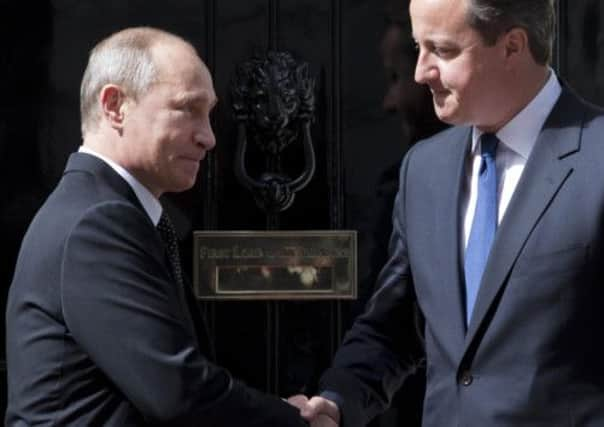Putin warning to the West not to arm Syria rebels


Following talks in Downing Street with David Cameron, he said the brutal behaviour of the rebels was inconsistent with the “humanitarian and cultural values” of Europe.
While he strongly defended the supply of arms by Moscow to the “legitimate” government of Syrian president Bashar al-Assad, he also stressed he wanted to achieve a diplomatic solution.
Advertisement
Hide AdAdvertisement
Hide AdMr Putin said that he believed the G8 summit, starting today in Enniskillin, in Northern Ireland, was “one of the most appropriate means” to seek an end to the conflict.
At a joint news conference Mr Cameron acknowledged there were “big differences” between them on who was to blame for the conflict but insisted they could be overcome.
Mr Putin, who has made no secret of his opposition to US president Barack Obama’s plans to start sending arms to the rebels, was unsparing when he was asked about previous comments by Mr Cameron, that those who armed the regime had “the blood of the children of Syria” on their hands.
“The blood is on the hands of both parties. There is always a question as to who is to blame for that.
“One should hardly back those who kill their enemies and eat their organs,” he said, referring to an incident when a rebel fighter was filmed taking a bite out of the liver he had cut from a dead Syrian soldier.
“It is hardly in relation to the humanitarian and cultural values Europe has been professing for centuries.”
Mr Putin was also unrepentant about supplying weapons – including sophisticated anti-aircraft missiles – to the Assad regime.
“Russia supplies arms to the legitimate government of Syria in full compliance with the norms of national law.
“We are not breaching any rules,” he said.
Advertisement
Hide AdAdvertisement
Hide AdIn contrast, Mr Cameron, who reiterated that he had not yet taken a decision to follow the Americans in arming the rebels, said Britain was simply seeking to support the “centre ground of decent moderate Syrians”.
He said he believed it was possible for Russia and the West to overcome their differences and make progress in the talks at Lough Erne.
“Where there is common ground is we both see a humanitarian catastrophe, we both see the dangers of instability and extremism, we both want to see a peace conference and a transition,” he said.
“So the challenge for the G8 and for this process is to try and put aside some of the differences and focus on the common ground where we both want to see a peace process, a transition, take place.”
The Russian president also indicated that despite the US announcement last week, the G8 was the right forum in which to try to move forward.
“I fully share Mr Prime Minister’s view that this is one of the most appropriate means of resolving the Syrian issue. The issue can be resolved only by political and diplomatic means,” he said.
Mr Cameron had invited Mr Putin to Downing Street ahead of the G8 specifically so they could discuss the Syrian issue which has emerged as the primary bone of contention between them.
The meeting opened with a moment of reconciliation, with the two leaders handing medals to the veterans of the Arctic convoys who helped keep Russia supplied during the dark days of the Second World War.
Advertisement
Hide AdAdvertisement
Hide AdEarlier, the Prime Minister received a fresh warning that even if he chose to join Mr Obama in arming the rebels he could find his path blocked in parliament.
A succession of politicians lined up to voice their deep opposition to any such move.
Deputy Prime Minister Nick Clegg was non-committal about the prospects, saying: “We clearly don’t think it is the right thing to do now otherwise we would have decided to do it.”
But former Liberal Democrat leader Lord Ashdown was more outspoken, saying it would be “an act of very considerable folly” that risked drawing Britain into a wider sectarian struggle, between Sunni and Shiite Muslims.